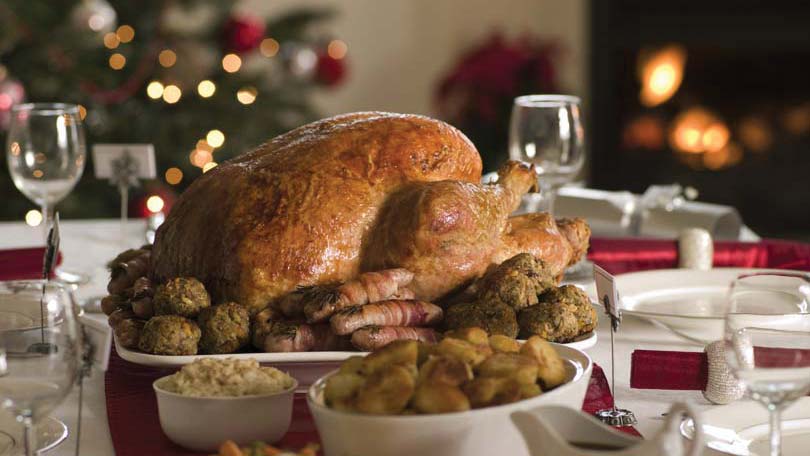
There are three different kinds of turkeys most often available to the consumer. There are self-basting turkeys, kosher turkeys, and natural turkeys. Traditionally processed frozen turkey is labeled basted’ or ‘self-basting.’ This means that it has been injected with a solution intended to make it more flavorful and tender. The ingredients in the solution, which vary from company to company, are listed on the labels of these turkeys. You may see ingredients as innocent as turkey broth and as dubious as emulsifiers and artificial flavors. Self-basted birds may have a satisfactory texture and be quite juicy; however, they may taste of unnatural flavors.
Kosher turkeys are processed mostly by hand and according to kosher law. Tasters generally preferred the juiciness of a brined, natural bird to the drier texture of a kosher turkey. Though their purposes are quite different, koshering and brining have similar effects on turkey meat. While brining consists of a single soak in salt water, the koshering process involves several steps. The turkey is first soaked in water for one-half hour. Then it is heavily salted and placed on an incline for about an hour to encourage the removal of blood. Finally, the bird is showered by final rinses of cold water. Because both koshering and brining encourage the absorption of water and salt, we do not recommend brining a bird that has been koshered.
‘natural’ turkeys are untreated fresh turkeys. This broad category includes free-range birds raised on small organic farms as well as birds raised for large commercial enterprises that are neither organic nor free-range. Locally grown, ‘all-natural’ turkeys usually need the moisture that brining provides. Experts recommend that it is best to buy fresh turkey and brine it yourself.
Brining a Turkey
A four-hour soak in a solution of 1 cup of table salt per gallon of water does the job for moderately sized 15-pound turkeys. There was a question if the salt levels should be adjusted for smaller and larger birds. Even for a rather large or small bird, then, the standard formula’1 cup of table salt per gallon of water’works just fine.
For overnight brine, halve the salt’use 1/2 cup table salt per gallon of water. There is no significant difference in birds brined for an hour or two longer than the standard four-hour or overnight brine; but if you go much beyond that, the bird will be too salty. Moreover, if you brine a turkey for only two or three hours, you will not get all the benefits of brining, which is moisture retention, thoroughly seasoned meat, and a better ability to withstand hot oven temperatures that are essential for crisp skin.
Oven Basting
Experts disagree about the advantage of basting a turkey while it cooks in the oven. Some cooks feel that adding natural juices to the exterior of the bird has little affect on the internal flavor or tenderness because the liquid barely penetrates beneath the skin. Others insist that the turkey should be basted every twenty to thirty minutes with the accumulated juices and fat from the roasting pan in order to keep the turkey moist as it roasts and to give the turkey that beautiful glazed crispy skin that graces the Thanksgiving Dinner and Holiday tables.
If you decide to baste the turkey throughout the roasting process, it is recommended that you remove the turkey from the oven and close the oven door immediately so that heat is not lost from the oven, which would require additional roasting time.
Turkey basters are devices that are used to spread moisture onto chicken, turkey or any other meat cooked in an oven. There are several different types of basters, such as the OXO GOOD GRIPS turkey baster, which boasts a unique bulb shape and collar that makes it easy to grip the baster two different ways for maximum comfort and control. The bulb is flat to prevent the baster from rolling on the countertop. The baster tube is made of crack resistant, high heat plastic for superior performance. Standard and metric measurement markings make it easy to see how much liquid is in the baster. It is also dishwasher safe on the top rack. The regular price is about $12.00.
Some cooks prefer to use a pastry brush or basting brush, which is a tool used to spread oil or glaze on food. Traditional basting brushes are made of plastic fiber similar to paint brushes while modern pastry brushes are frequently made out of silicone. When roasting meats, a basting brush can be used to sop up juices or drippings from in the bottom of the pan and spread them on the skin of the animal to crisp the skin.
If neither of the above utensils appeals to you, you may prefer to use a long handle basting spoon. The spoons are available in stainless steel and come either with or without a handle. They range anywhere from 11’ to 21’long and are available either perforated or solid.
How to ensure that your turkey will be tasty and succulent is a matter of personal choice. Enjoy!
